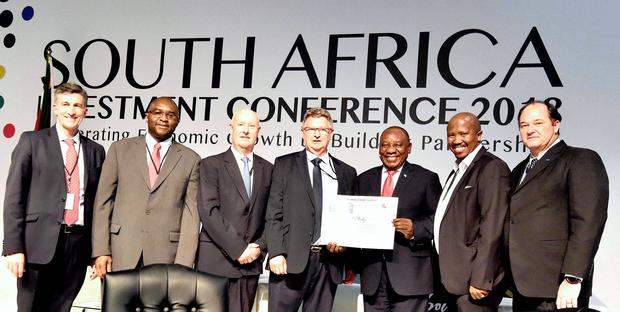
By Sqiniseko Mbatha, Financial and Development Impact Analyst, TUHF21
Even as South Africans dare to start returning to “life as we knew it” under Level 1 lockdown, another global threat is making headlines. The Intergovernmental Panel on Climate Change (IPCC)’s Sixth Assessment Report1 was released in August 2021 and has been called a “‘Code red’ for human-driven global heating”. With this, governments and companies around the world have issued statements on their commitments to achieving net-zero. South Africa2 was among them, adopting a more ambitious emissions reduction target ahead of the UN’s COP26 in November.
We have also witnessed during the COVID pandemic and the recent unrest in July, that issues of poverty, the transformation of the economy and inclusive growth cannot be ignored. We need instruments that bring South Africans to the mainstream economy, ensuring that all are invested and have a share in the countries prospects.
According to Francois Engelbrecht of the Wits Global Change Institute and Pedro Monteiro of the CSIR SOCCO3: “South Africa is globally one of the top five countries in terms of carbon emitted per unit of energy. To meet net-zero global objectives, the challenge will be to transform its carbon-intensive economy, and simultaneously meet its development needs and objectives through a just transition.”
Though the country’s heavy reliance on fossil fuels for energy is at the heart of its carbon-intensive economy, the contribution of urban sprawl to this and to the country’s socio-economic ills4 shouldn’t be underestimated. We believe that ESG and Impact Investing in urban housing development have a crucial role to play, not only in terms of reducing carbon emissions but in meeting South Africa’s development needs and facilitating a just transition.
ESG – or Impact – Investing
ESG investing focuses on investments that meet Environmental, Social and Governance criteria to allow socially responsible investors to incorporate their values and concerns into their selection of investments along with potential profitability or risk. In South Africa, and indeed in many other emerging markets, these types of investments have long been recognised as key to both containing and reducing carbon emissions, and uplifting impoverished communities. There is a need to push for developments that prioritise environmental and social returns (along with financial ones) through legislated incentives. However, incentives – either positive or negative – have not been forthcoming. This means that investors who prioritise social and environmental impact returns remain few and far between. But this is changing.
As an impact-focused lender with an 18-year track record of successfully financing inner-city residential buildings to provide affordable rental housing, TUHF has long been leading the charge for real development impact. With the assistance of Standard Bank, TUHF launched its ground-breaking Sustainable Bond Framework, which has also been independently verified by ISS ESG. Following this launch, TUHF issued South Africa’s first Social bond, Urban Ubomi 1, as listed on the JSE Sustainability Segment, earlier this year. Another such issuance is also planned for the near future.
The Sustainable Bond Framework allows TUHF and its associated structured finance vehicles to issue Green, Sustainable and Social bonds that support its lending to qualifying projects and ensures that the relevant impact that TUHF has, such as providing funding in the affordable housing space and providing access to finance for small scale property entrepreneurs, is recognised.
Uplifting our country, saving our planet
TUHF’s Framework contributes to five of the UN’s SDGs, including alleviating poverty, affordable and clean energy, decent work and economic growth, sustainable cities and communities, and climate action. Additionally, the Framework aligns to principles outlined by the International Capital Markets Association (ICMA), namely “The Green Bond Principles” (GBP), the “Social Bond Principles” (SBP) and the “Sustainability Bond Guidelines” (SBG). Our social bond issuances both meet all the social requirements of the sustainable bond framework, and we are working hard to meet all the green criteria in the framework as well in the not-too-distant future.
By offering investors a framework by which to measure the social and environmental impacts of their investments, we hope to encourage more investors to prioritise these. The uptake of our first sustainable bond issuance was extremely encouraging, and we believe investors are clearly realising the value of making sustainable investment choices.
As we emerge from the pandemic, we find that social inequalities that have long been of concern – such as lack of access to affordable housing and lack of access to funding for entrepreneurs – have reached critical intervention point..
Since inception, TUHF has financed over 44 000 units of affordable rentals units in areas of economic opportunities that have effectively improved many livelihoods. TUHF has supported over 400 entrepreneurs many of whom have grown it to successful landlords with sizable portfolios. Our projects have created 8600 permanent and short-term jobs over the 6-years. These stats demonstrate our ability that TUHF’s impact investing is a key piece of the puzzle in addressing and correcting social and environmental ills in our country, as it provides an avenue for private capital and the capital markets to make a measurable contribution towards transforming South Africa for the better.
More news
- CELEBRATING EXCELLENCE IN THE RESIDENTIAL PROPERTY SECTOR
- PART 4: GIBS PANEL DISCUSSES INTEMEDIATE CITIES ROLE IN AFRICA’S DEVELOPMENT
- EXPOSED AGGREGATE PAVERS COMPLEMENT NEW LIFESTYLE CENTRE
- GIBS PANEL EXPLORES ROLE OF INTERMEDIATE CITIES IN SA’S DEVELOPMENT PART 3
- CITI-CON’S CONCRETE KNOWLEDGE SUCCESSFULLY DEPLOYED ON NEW LANDMARK DEVELOPMENT





